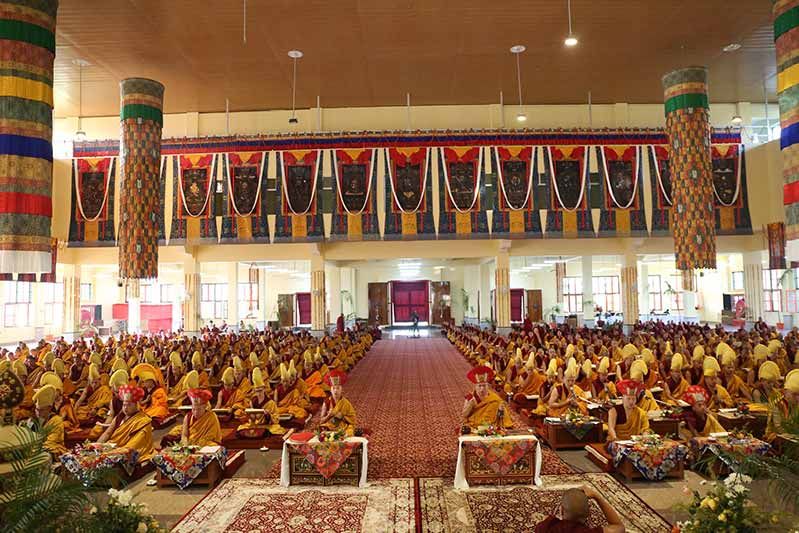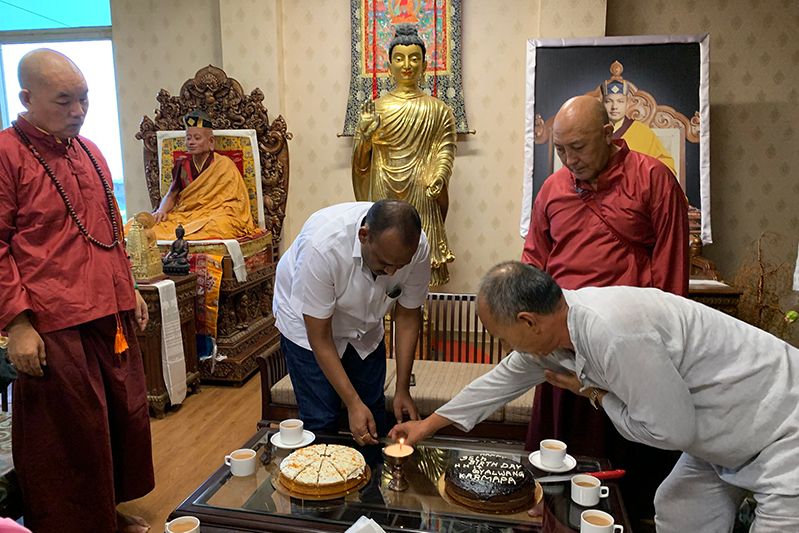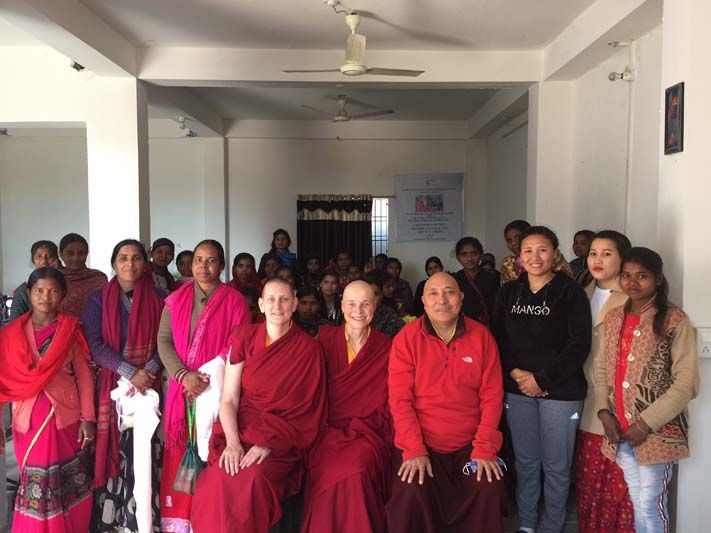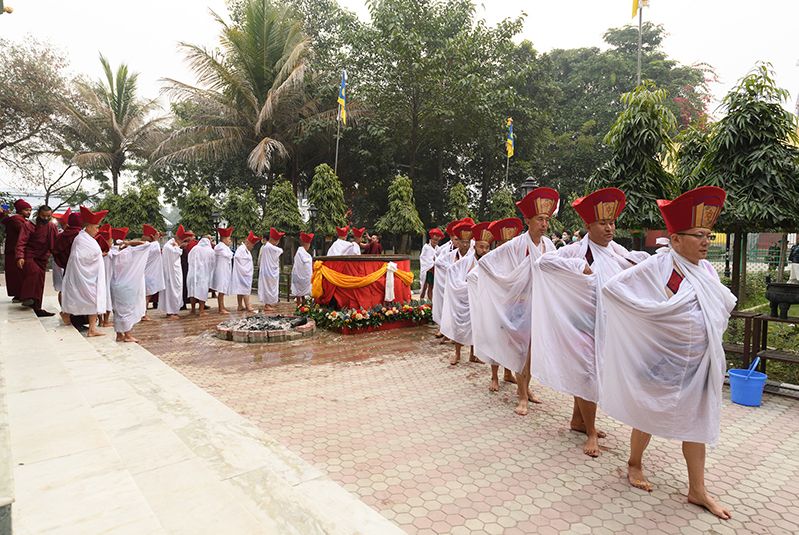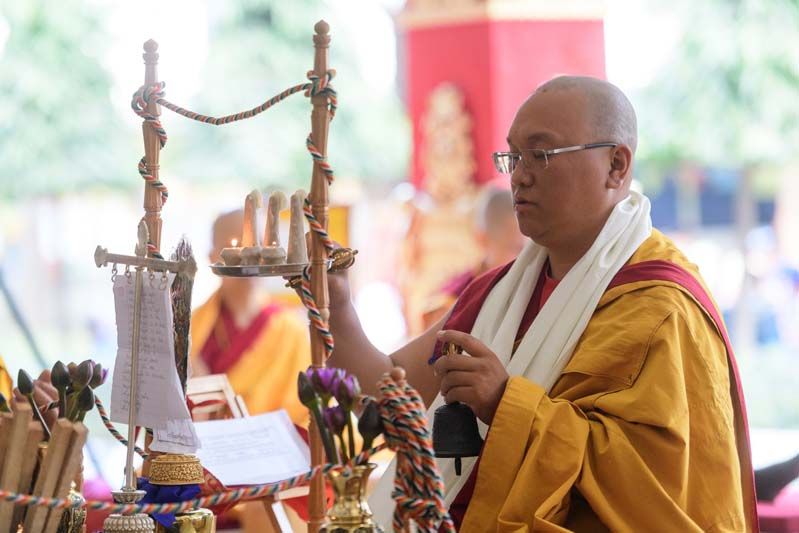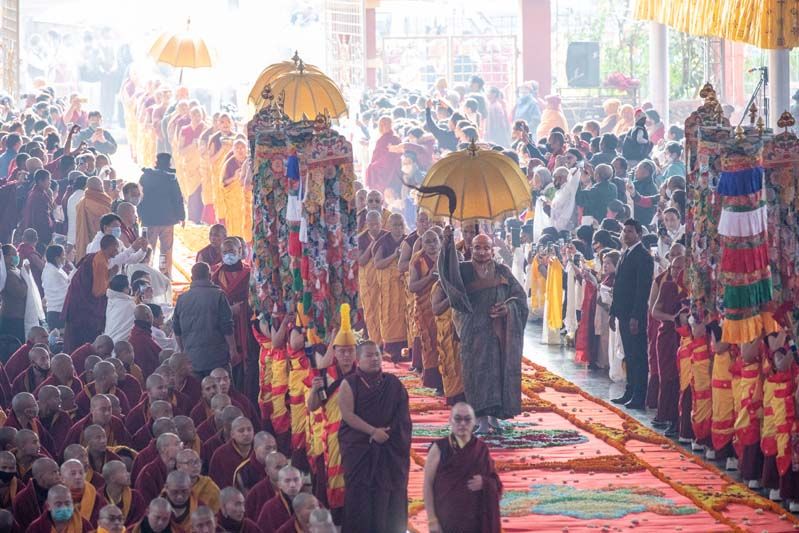HE Goshir Gyaltsab Rinpoche on Mind Training: The Seventy-Two Exhortations: Day Two: Seeing Our Faults Clearly
- February 3, 2020
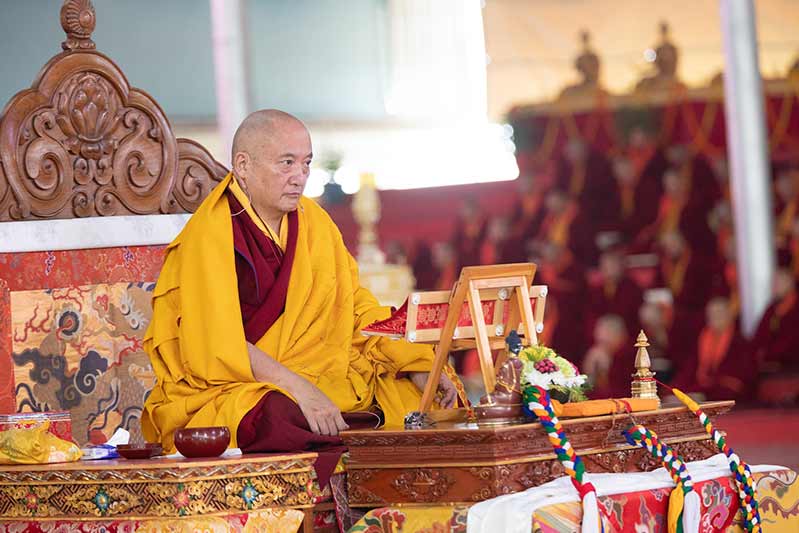
Monlam Pavilion, Bodh Gaya
February 3, 2020
Today’s session began with expressions of gratitude to Gyaltsab Rinpoche with offerings small and large followed by the vow to bring all living beings extending throughout space to the state of full awakening. With this intention, the ordained and lay sanghas listened as HE Goshir Gyaltsab Rinpoche continued his teachings on Kharak Gomchung’s text on mind training.
Yesterday, Rinpoche had explained that the teachings of the text were virtuous in the beginning, middle, and end, and that now he had finished the first section. Today he turned to the second section, virtuous in the middle, starting with Verse Four:
All pains and pleasures of the present
Depend on karma from the past,
So you do not have any choice—
Whatever happens, make it your friend. (4)
Commenting on the first line, Gyaltsap Rinpoche said that whatever pain or pleasure you might experience, there is no place in samsara without suffering. When we are young children, sometimes we experience pleasure and sometimes pain. Now that we are older adults, we know the nature of samsara to be suffering. In brief, there is no period of our lives when we do not experience suffering.
Since we live in this world, we have to eat food and wear clothing. In the case of eating, there’s the difficulty of obtaining food, which we have to prepare and cook, and afterward we must clean up. (This process involves some subtle types of suffering as well.) In this world even if we have small pleasures like eating, we are surrounded by difficulties. We eat to sustain our body but if we eat too much it becomes painful. Likewise, there are many causes of pleasure but if we overdo it, pleasure becomes a cause of suffering. In brief, if we have accumulated few causes for suffering, we will experience a little pain but if we have stored up many causes, our suffering will be great. One leads to the other, because it is not possible for suffering to be a cause of pleasure.
Turning to the second line, Rinpoche explained that all our pains and pleasures result from the karma of our previous lifetimes when we created both the causes of happiness and of suffering. Since the causes were mixed, the results—the pain and happiness we experience—are also mixed. The problems and pleasures of this present life, whether great or small, all depend on our karma from the past. Since everything is interrelated, dependent one on the other, we are compelled to experience the results of the causes we have sown. As the third line states, “So you do not have any choice.” You cannot take just the pleasure and toss away the pain or pray to some protector to do this for you.
However, there is something we can do. Through practice, we can develop skilled methods such as, “Whatever happens, make it your friend.” How do we do this? When we are feeling happy, we use that situation to practice with the wish to bring happiness to all living beings. When we are experiencing suffering, we can think that we are confessing all the misdeeds we have done and also those of other beings.
These methods of confession and purification are found in the practices of mind training and also in the vajrayana. Through these, whether we are feeling pain or pleasure, we can bring both onto the path of practice.
Verse Five speaks of impermanence and suffering:
The pleasures of this life are fleeting.
If you want lasting happiness,
You must willingly accept
All the minor sufferings of this life.
Life is short and fleeting. Human lives are not long—whether we are rich, of high status, or famous, it makes no difference, all must pass. If you seek lasting happiness, look to the Dharma for it is this practice that brings the result—a happiness that will not decline or diminish but last for eons. If we want this lasting joy, we must be willing to accept the minor sufferings of the human realm, which cannot compare to the sufferings of the lower realms, the animals, hungry ghosts, and hell beings. If we dedicate our lives to practicing the Dharma, we can achieve the lasting happiness of buddhahood that does not diminish.
Next is verse 6:
Even the tiniest present pains
Can exhaust sufferings from past deeds
And become pleasure in the future,
So cultivate joy for suffering.
Since the pains we experience now are small by comparison, we should use these sufferings to endure difficulties. If we practice the Dharma, we can exhaust great misery from the past. This is what all the great mahasiddhas of the past have said. When we engage in the Dharma, numerous small pains and difficulties can occur because our karma from the past is ripening quickly. Through experiencing these relatively minor difficulties and pains, we can eliminate future suffering.
We might wonder about this when we see people who have done terrible things and still their lives go well and they find what they want. But this is deceptive. What is happening is that since they have accumulated all the causes for being born in the lower realms, the causes for future happiness are ripening in this lifetime. From this perspective, we can feel joy when suffering comes.
Verse 7 reads:
Adversity is a spiritual friend.
Obstacles inspire spiritual practice.
Suffering is the broom of misdeeds.
Don’t be upset or view them as misfortune.
A spiritual friend is someone who inspires us to practice the Dharma and teaches us to give up what is not virtuous and practice what is. Actually, adversity resembles a spiritual friend. When the Buddha saw suffering, he realized that he had to escape samsaric life. Milarepa’s suffering spurred him to transcend samsara. If we look at the histories pertaining to the time of the Buddha, we can read the lives of the arhats, who were suffering in the life of a householder. They met the Buddha and went forth, leaving their home to follow him. On the basis of great suffering both Gampopa and the 1st Karmapa, Dusum Khyenpa, felt weary of the world and entered the gate of the Dharma and practice. We can find similar stories in other spiritual traditions as well.
In the second line of the verse, “obstacle” refers not to a Dharma obstacle but a worldly one. For example, a business person loses all their wealth or an individual who wants a high status is prevented from attaining it or they have it and then lose it. “Obstacle” here refers to something that makes us descend from a high to a low position. When this happens, it should inspire us to engage in the Dharma, to leave worldly dharma (or relative truth) and turn to true Dharma practice.
The third line compares suffering to a broom; we can use it to sweep away suffering and all the misdeeds that cause it. Our experience of suffering can purify misdeeds just as it did for Milarepa who underwent great hardship to cleanse away his negative actions. The fourth line counsels us not to be upset. When someone has done some things we do not like, we need to be patient and meditate on love and compassion, thinking, “It’s not their fault but my own.” This practice will purify innumerable wrong actions and allows the perfection of the two form bodies: the nirmanakaya—the manifesting nature of the mind of the Buddha who performed the Twelve Deeds—and the sambhogakaya, which does not pass away until samsara is empty. Both of these bodies derive from meditation practice.
The next verse 8 gives a warning:
Fame is the flattery of the maras.
Respect is the lasso of the fetters.
Good fortune is a block to spiritual practice.
Do not view poison as medicine.
Whether we are male or female, at a young age we might be good-looking but this appearance is deceiving. How so? We’re just seeing the surface of a skeleton, which is like a cage of bones holding organs and blood. If we could actually see these, we would find them rather disgusting. Further, our body is covered over by a thin layer of skin that has to be cleansed to keep up appearances.
In terms of Dharma terminology, there are the five aggregates or skandhas—form, feeling, conception, mental formation, and consciousness. However, the Abhidharma explains that in the time of the Buddha Kashyapa, these were called “the five deceivers” because they mislead us. Also misleading are the parks and nice roads we use these days. On the surface they seem pleasant, but they require a lot of maintenance, and if this is ignored, they become old, worn out, and unattractive. When we become certain that this is true of all things, we will not be attached to external objects nor to our body; breaking through these attachments, we concentrate on practicing Dharma.
Gyaltsab Rinpoche then asked people to meditate for two sessions of a minute each: first on the body as it was described above in order to become free of attachment to it, and then on external objects in order to become free of attachment to them.
The first line of verse 8 means literally, “Fame is the maras tossing tsampa.” Tsampa is roasted barley flour and a staple of the Tibetan diet. If the maras toss about this delicious food, people will smell it, and the maras can lead them astray by their noses. For example,
when you are well known with a good education or high status, and people talk well about you, this becomes a distraction that takes us on a detour down the wrong path.
The second line states, “Respect is the lasso of the fetters.” What are these fetters? When others give us respect and fine gifts or say nice things about us, we get proud and our delusions increase, as do jealousy and other afflictions. In this way, we bind ourselves with the fetters of samsara.
The third line, “Good fortune is a block to spiritual practice,” is true because we get attached to all the myriad things we acquire. Since we cannot give them up, we are stuck spending our precious time taking care of them. This is how good fortune puts a road block in our path of practice. Fame, respect, good fortune are like poisons—they kill off the opportunity to practice Dharma—and so the last line warns, “Do not view poison as medicine.”
Verse 9 talks about the delusion of projections:
If you don’t cut through the ideas you project,
Whatever you do, you’ll never be happy.
For those who see through their own projections,
Misfortune appears as a friend.
When we are engaged in projecting, we believe that something exists when it does not. For example, we take a self to exist when it does not, or we misperceive, taking what is actually suffering (or its certain cause) for pleasure or taking what is impermanent to be permanent. We believe that our body and mind, which are always changing, are permanent. We think that today’s body is the same as yesterday’s or that the outer world does not change from day to day. The consequence is laid out in the second line, “Whatever you do, you’ll never be happy.”
The next line speaks of those who “see through their own projections.” How can they do that? By engaging in the study and contemplation of Dharma, which develops their prajna or wisdom. If we do not cut through the false ideas we entertain, nothing we do will make us happy. We may try our hardest, but it never works out as we wish. We might think we’re going to practice the Dharma, but if we do not cut through these delusive projections—taking a self to exist when it does not, and so forth—we will miss the true path and not attain the happiness that comes from practicing the genuine Dharma.
Studying and reflecting on the Dharma brings us the knowledge we need to cut through these projections. We reflect on the words of the Buddha and the commentaries by later masters. We read histories that teach through example—such as the stories of the Buddha’s past lives in the Jataka Tales or the lives of the great masters of the past—to learn how they cut through projections. We also listen to our own gurus, who teach, for example, that everything conditioned is impermanent, that samsara is suffering, and that a permanent, independent self does not exist. We reflect on these ideas and bring them into our experience through practice, plumbing our personal histories to see the pleasure and pain we have known in this lifetime.
In this way, we develop the certainty that allows us to cut through deluding projections. We can also study the words of the Buddha and treatises about his teachings to find various reasonings, such as interdependence, or that an object is not single or multiple. In sum, for learned people who can see through their projections, both good fortune and adversity become aids to practice.
Verse 10 speaks of the hidden faults in our minds:
If you aren’t embarrassed by your own mind,
Others’ rebukes are an illusion.
Do not listen to others’ words.
Instead, make your own mind the judge.
If we are not now embarrassed by our own mind, we should try honestly to look at our own thoughts, which will embarrass us. We have to see them for ourselves, as “Others’ rebukes are an illusion.” The line that states, “Do not listen to others’ words,” could mean that we should be patient with what they say. There are many stories of masters whose sole practice was patience. The line could also mean that sometimes we have to ignore what others are saying. For example, there are stories of lamas who were criticized for their generosity, for giving away too much.
What is important is to “make your mind the judge.” The Buddha spent uncountable eons looking at his mind. Milarepa spent long hours in meditation looking at his faults and giving them up.
Verse 11 takes a long-term perspective:
Do not build yourself up in this life,
Using Dharma to deceive by acting
Counter to dharma as if that were dharma.
Put the worldly out of your mind.
“Do not build yourself up” means not to present yourself as an important person, not to boost yourself up through using the Dharma to bolster your credentials. In brief, do not use the Dharma to accomplish mundane aims. Put the world out of your mind and give it up entirely.
Verse 12 continues this line of thought:
Of the two, fame and bounty in this life
And the Dharma that helps in the next,
Do not just do whichever comes up
Or else whatever carries you away.
Definitely practice the dharma for the next.
This verse presents two types of Dharma: the Dharma that helps to pile up possessions in this lifetime, and the Dharma that literally, “is for death,” which means for our next life. In brief, the two types are the Dharma that helps in this life and the Dharma that helps in the next. We need to maintain a focus, and not do whatever appears or carries us away, thinking that the Dharma for this life and for the next are the same.
Many people are preoccupied with helping themselves in this life by amassing fame and riches. People even use the Dharma to this end, teaching for the money or fame it offers. This is using the Dharma to do something in this lifetime. But actually, it is the Dharma that relates to death and what follows that we should be practicing.
Verse 13 reads:
Nothing is rarer than an entourage with faith and respect.
Nothing is worse than a scoundrel for a leader.
Don’t act like a bigwig, admired by all.
Grasp the humble aspects of lowliness.
Not everyone is the same: some have faith and respect and others have none at all. There are some leaders who are good and think of the Dharma and benefitting the teachings; others are ambitious and think about making themselves great in the world. As the verse states, “Nothing is worse than a scoundrel for a leader,” so do not try to aggrandize yourself, giving off airs as a bigwig with an entourage. Do not seek the illusion of fame.
Instead, like a beggar, take the low and humble way. Stay in caves and move often from one to the other. If you stay too long in one place, people will find out and come to make offerings and prostrations, creating obstacles for your practice. If you go to another, people will again find you and ask for teachings, so then you move again. For these reasons, Milarepa roamed the mountains, not staying too long in one place.
Continuing the thought of being humble, verse 14 states:
You are the lowliest in the world.
Being envious and competitive
Toward others with merit while unashamed
Of your own faults is a mistake.
We are the lowest in the world because we have afflictions, such as pride and jealousy, and do not possess a lot of faith or the wisdom that leads to liberation. Ashamed of these faults, we should seek to remedy them.
Leaving the audience with much to contemplate, Gyaltsab Rinpoche concluded his second talk on the Mind Training: The Seventy-Two Exhortations by Kharak Gomchung.
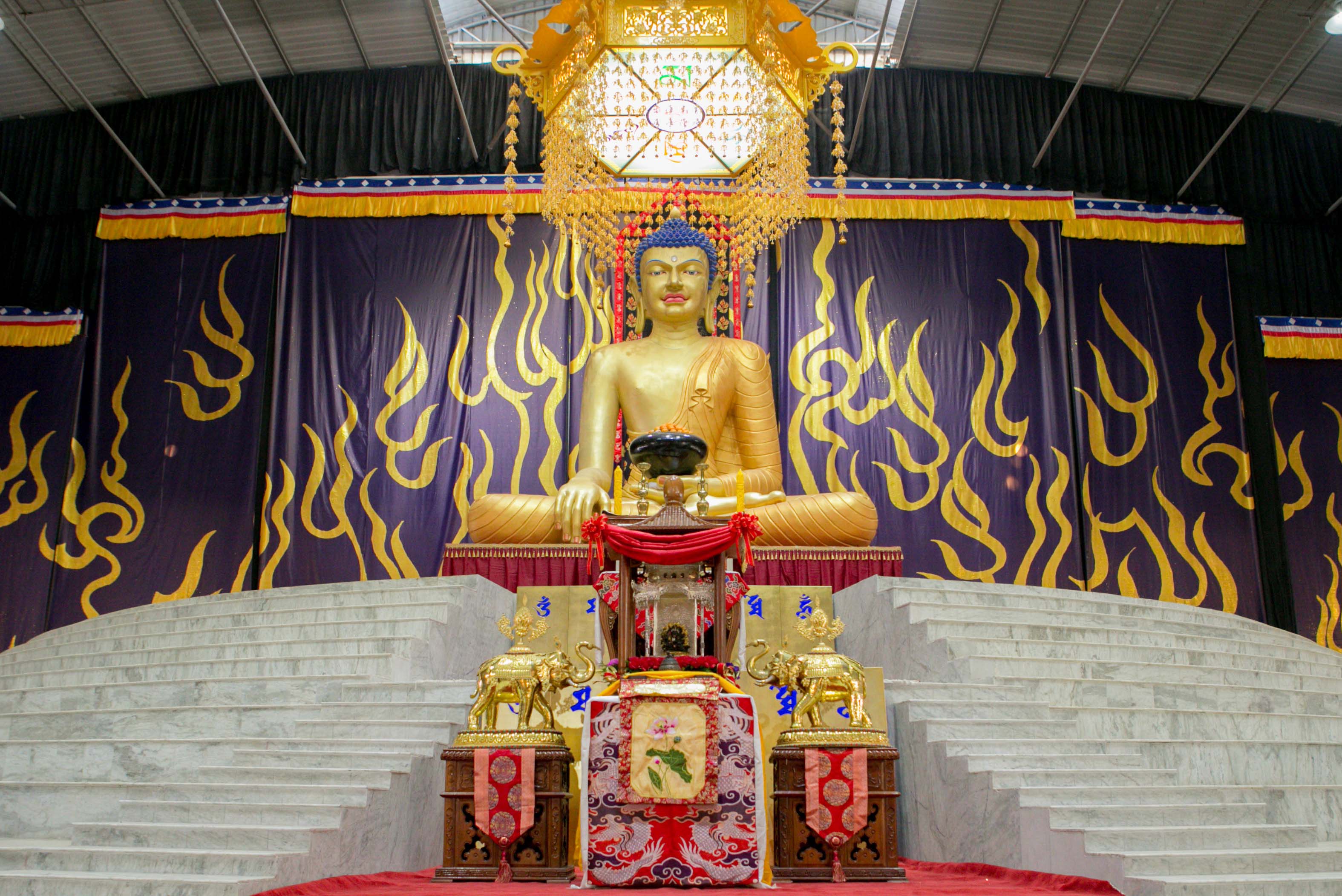
37th Kagyu Monlam Schedule
Tibetan / English / Chinese • French • German • Indonesian • Korean • Polish • Russian • Spanish • Vietnamese
Dharma Teachings
 Meditation Instructions
Meditation Instructions
Recorded during the 37th Kagyu Monlam, Bodhgaya, India. January 28-30, 2020.

